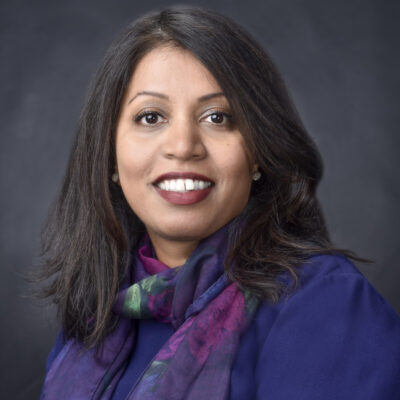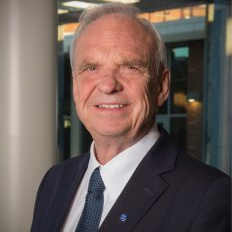Late last semester, educators, stakeholders and partners from around the globe gathered virtually to consider the challenges and opportunities of navigating the new normal in higher education in ways that are both sustainable and inclusive.
More than 450 people from 60 countries attended the second Sustainable on the Go conference, which took place Nov. 17. The conference was co-organized by York International (YI), the UNESCO Chair in Reorienting Education towards Sustainability and their international partners: the International Association of Universities, the Canadian Commission for UNESCO and Okayama University in Japan.

Conference co-chairs York’s Assistant Vice-President, Global Engagement and International Partnerships, Vinitha Gengatharan, and Charles Hopkins, UNESCO Chair in Reorienting Education Towards Sustainability at York University, welcomed attendees.
“York University and strategic partners, for the first time, brought together two fields [international education and online education] that had been perceiving each other as opposites rather than complimentary partners in a discussion for a better future,” said Gengatharan. “Through the SOTG initiative, we were delighted to explore the opportunities that a new virtual world was providing to the international education sector to foster mobility and collaborations between different parts of the world while collectively acknowledging that in-person experiences of other cultures will continue to be important in developing connections and nurturing compassion for each other.”
Hopkins noted that there was a strong emphasis at SOTG 2022 on engaging youth.
“We asked young leaders from 18 countries what is needed to truly and practically enable future leaders from all backgrounds. Their views gave us new perspectives on our themes and the way we conducted the conference this year.”

Those three themes – Connecting the Global and Local Classrooms; Sustainable and Inclusive Global Learning; and Local and Global Community Engagement – became the subjects of SOTG 2022’s three plenary sessions. The first featured a keynote address by Leonardo Garnier, former minister of education in Costa Rica, special adviser for the 2022 United Nations Transforming Education Summit.
“The COVID pandemic was a terrible blow to education systems,” Garnier said. “As we recover, it would be a shame to go back to where we were. We must reimagine and transform education so we can transform society and create a sustainable future.”
From Garnier’s perspective, this means transforming the education system to solve issues of equity, making schools (education institutions) places that are safe, inclusive, welcoming and stimulating. It means supporting teachers to be facilitators who collaborate to promote learning based on curiosity and joy; and it means harnessing the digital revolution properly so it can close the gap on inequalities.
“We are not invested enough in education,” Garnier said. “Only 10 per cent of the world’s children participate in higher education and that translates into a disparity. Often, education doesn’t reach those who need it most.”
Bhavani Rao, UNESCO Chair in Women’s Empowerment and Gender Equality from Amrita Vishwa Vidyapeetham University in India, delivered the second keynote address focusing on sustainable and inclusive global learning. Rao has been involved with technology-based women’s empowerment projects since 1995.
“There are two types of poverty,” Rao said. “One relates to a lack of food, clothing and shelter; the second is a lack of love and compassion. If you solve the second, you will solve the first.”
Rao explained the mainstream education program at her university, which has a life skills component that requires each student to spend a month living in a rural community in order to gain respect for simpler life there, along with humility.
“The students gain an understanding of the strength and knowledge in these communities and their inner resilience,” she said. “It awakens compassion and respect. We must shift the world from being about ‘me’ to being about ‘us’ and this program allows that shift to happen.”
Kenisha Arora delivered the third keynote address of the day, focusing on local and global community engagement. Arora, a medical student at Western University in Ontario, is the youth representative to the UN SDG 4 High-Level Steering Committee for UNESCO.
“My parents came to Canada from India to help us access the higher education that is the dream for many students around the world,” Arora said. “I hope to live in a world where post-secondary education is accessible to everyone, and youth are the cornerstone for transforming education – not only in advocating, but in increasing capacity.”
She noted that education also occurs outside the four walls of the classroom and that interdisciplinary learning is the way of the future.
“We need to learn how to learn and adapt,” Arora said. “Curriculum isn’t enough. We need to be able to take what we learn and apply it with empathy and human skills.”
The keynote sessions each ended with a dialogue between the speaker and another expert in the field. SOTG 2022 also included parallel sessions, including one featuring James Simeon, associate professor in York’s School of Public Policy and Administration, and his international collaborators from Mexico and Ecuador discussing their work in creating a globally networked learning (GNL) project for their students. Dominique Scheffel-Dunand, York-GNL academic lead, associate professor of French studies at York, chaired a second session that included Ian Garrett, an associate professor in the School of Arts, Media, Performance & Design, presenting a case study in GNL with Australian university partners.
In addition to its success in broadening thinking about international education, SOTG 22 underscored a number of the priorities in York’s University Academic Plan: 21st Century Learning, Working in Partnership and Advancing Global Engagement.
Originally published in YFile
